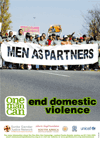In behaviour change campaigns, and when designing mass communication tools to support all types of campaigns, it is important to gain a precise idea as to the target audiences’ knowledge and behaviour regarding the campaign issue. The case study below shows how such formative research informs campaign design.
Case Study: The One Man Can Campaign in South Africa
As South Africa has amongst the highest levels of domestic violence and rape in the world, and the largest number of people living with HIV, women are particularly vulnerable. One Man Can (OMC) was launched by the NGO Sonke Gender Justice in partnership with South African and international organizations during the 2006 Sixteen Days of Activism against Gender Violence. Funded by the South African Government and international donors including UNICEF, the IOM and the Ford Foundation, the campaign was implemented in all nine South African provinces.
Activities: The campaign supports men and boys to take action, individually and collectively, to end domestic and sexual violence and to promote healthy, equitable relationships that men and women can enjoy. The campaign uses interlinking social change strategies including:
- Awareness-raising and community education, e.g. in One Man Can workshops, murals, door-to-door campaigning, rallies and marches, street soccer festivals, the use of radio, television and print media, and a rich web-site including practical advice, digital stories, campaign songs and research reports.
- The One Man Can action kit – which provides men with resources to act on their concerns about HIV and AIDS and about domestic and sexual violence – is fully accessible through the website (see below). It can be used both by individual men as well as representatives from government, NGOs, CBOs and community groups who work with men and women to address issues of gender-based violence and HIV/AIDS. A particular feature of the campaign website is the easily accessible, precisely targeted, practical advice (action sheets) it offers in five languages, to sports coaches, fathers, religious leaders, teachers and youth respectively.
- Advocacy and public mobilization for policy change and effective implementation of policies against VAW.
Capacity-building for partner organizations and institutions who are active in the One Man Can Campaign, especially in terms of networking and coalition-building.
Formative Research:
The One Man Can Campaign relied on a range of research methods to determine its content and design. To decide on the content of the action sheets, Sonke reviewed existing materials that had been developed elsewhere. Focus group discussions with survivors of violence, faith-based leaders, teachers, sports coaches, youth and adult men were held. Sonke also carried out a number of street surveys, stopping men in shopping malls, restaurants, barber shops and bus stations to find out how they understood the problem of men's violence against women and what they would be willing to do about it. This formative research indicated that men and boys were concerned about domestic and sexual violence but that they often did not know how to act against it. To come up with the look of the campaign, Sonke worked with a youth advisory team and tested different logos on the streets of Cape Town and Johannesburg with 120 men and women.
Impact Evaluation: Results
The campaign had a positive effect on the communities where it was carried out. Phone survey data indicate that particularly the workshops have had a positive effect on behaviour in the weeks following Sonke workshops: 25% of the participants reported having accessed voluntary counseling and testing services; 50% reported witnessing acts of gender-based violence in their home or community and of this group, 50% reported these to the police, about a third (37%) reported them to community structures and 4% to local NGOs. 61% of participants reported increased condom use. More than 4 out of 5 participants at Sonke workshops also reported having subsequently talked with friends or family members on the campaign issue. The assessment was chiefly based on phone surveys with OMC Campaign participants, and data routinely collected by government and NGOs in three provinces. Its conclusions have also been informed by a larger qualitative research project underway in seven South African provinces with participants in the broader OMC Campaign.
See the campaign website for the One Man Can Campaign Kit and multi-media materials in English, Afrikaans, isiZulu, isiXhosa and French.
Source: Colvin, 2009. Report on the Impact of Sonke Gender Justice Network’s “One Man Can” Campaign....